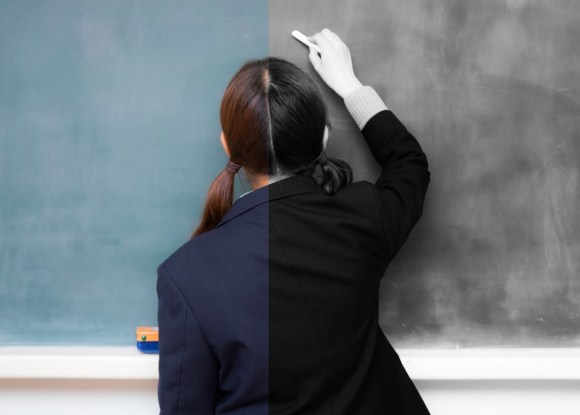
Teachers felt student was disruptive to education with her wild brown hair.
In Osaka District Court, on 27 October, opening arguments were held in the trial of an 18 year-old woman suing Osaka Prefecture for mental anguish over repeated insistence that she dye her naturally brown hair black in order to conform with her school’s dress code.
In junior high, she was forced to continuously dye her hair black and hated every moment of it. So, when it came time to enter high school, the plaintiff’s mother tried to make arrangements with Kaifukan High School in Habikino City in order to not repeat the same awful experience.
● Natural Hair Color Registry
Some high schools in the Osaka area have introduced a Natural Hair Color Registry where students with non-black hair can become identified as such and not face the scorn of their school. At the time of enrolment, students have the color values of their hair measured and put on record so that staff can check if it has been altered.
Some Tokyo schools are said to have a similar system wherein students can get a Natural Hair Color Certificate to confirm that they aren’t dying.
According to the complaint, the plaintiff’s mother asked her high school if they had a Natural Hair Color Registry that she could sign up for, but they said they did not. Nevertheless, she seemed satisfied enough with the overall response from the administration and signed her daughter up.
● Our School has a no-dye policy, so you must dye your hair
However, after classes commenced, the plaintiff began getting occasional warnings from teachers and counsellors every week or two. The staff of the school, feeling duty-bound by the school’s no-dye/no-bleach policy, wanted the plaintiff to dye her hair black in conformity with the majority of the student body.
Lawyers for the defense argued that, “For example, even blonde foreign students are required by the rules to dye their hair black.” It bears repeating; the absurdity that they are required to dye their hair by a rule intended to prohibit dying of hair.
Nevertheless, tensions between staff and the plaintiff escalated and by the second semester of her second year, warnings to dye her hair black had increased to about every four days. Due to the repeated dye jobs the plaintiff’s hair had become brittle and a rash developed on her scalp.
● Blacklisted
During this time, she was also prohibited from taking part in school festivals and field trips because of her hair color.
During one “warning” a teacher asked, “Is it because you have a single mother, that you always change your hair color to brown?” The incident caused the plaintiff to hyperventilate and be rushed to hospital.
Finally, in September of last year, one teacher told the plaintiff, “If you’re not going to dye your hair black then you don’t need to come to school.” So she never went back.
In April of this year, the school removed her name from its list of students and allegedly told other parents and students that she had been expelled.
Having pretty much lost her education due to the color of her hair, the plaintiff is suing the Osaka Prefectural government for 2.2 million yen (US$19,000) in damages from what her lawyers say amounts to systematic and institutionalized “bullying.”
● DNA code
The school and board of education have refused to comment on the case as it is ongoing, but defense lawyers have requested that the case be thrown out of court.
Junior high and high schools in Japan are notorious for the severity of their dress codes, in some cases pushing it to its limits. However, a line certainly needs to be drawn somewhere. In order to balance the desire for “harmony” of the student body and a student’s right to protect their own body, the Natural Hair Color Registry is a popular solution, but is not considered mandatory by boards of education and left up to each school’s discretion.
A principal for one of the schools, which has a Natural Hair Color Registry of only ten students, told Mainichi Shimbun, “We’ll continue this system in order to protect the human rights of our students.”
Source: Asahi Shimbun, Mainichi Shimbun
Images: Pakutaso 1, 2 (Edited by SoraNews24)